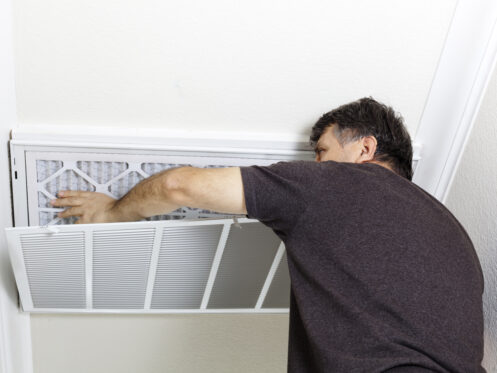Air filters sieve out allergens and other airborne contaminants during HVAC operation. Not only do these components protect the interior of heaters, heat pumps, and air conditioners from heavy particulate debris, but they also protect the quality of air in your Lincoln, NE home. With regular filter changes, you can maintain a consistently high indoor air quality (IAQ), curb your heating and cooling costs, and ensure optimum HVAC performance. Read on to learn how frequently you should change your HVAC air filter for maximum benefits.
General Recommendations for Air Filter Changes
Most HVAC systems come with standard air filters pre-installed. If you continue using standard air filters in your home, you should inspect this component monthly and change it every one to three months. Standard air filters offer adequate protection for HVAC equipment and limited air quality benefits. They’re low in cost, easy to find, and can optimize airflow when clean.
How to Inspect Your Air Filter
When following general recommendations for standard HVAC air filter changes, you must still decide whether to swap this component out once each month or once every 90 days. To do so, pull your air filter out and hold it up to the overhead light. In theory, if light can pass through a filter’s mesh, air can move through it as well. When collected filter debris is heavy and light can no longer pass through your filter’s mesh, it’s time to swap this component out.
Performing monthly filter inspections is the best way to avoid filter-related heating and cooling issues, including:
- Short cycling
- Overheating
- Unpleasant HVAC odors
- Icing
- Increased energy use
You can set a simple, easy-to-remember filter inspection schedule such as performing these inspections on the first day of every month. However, if you have a programmable or smart thermostat installed, you can alternatively set this device to issue regular “change filter” reminders.
Why HVAC Air Filter Changes Are So Important
The air that moves through HVAC systems always carries micro-fine particulates with it. HVAC equipment manufacturers designed these components to limit buildups of debris that would otherwise diminish efficiency and performance, shorten heater and AC lifespans, and set the stage for costly repairs.
Warranty Compliance
Changing your HVAC air filter every one to three months could be necessary for maintaining compliance with the terms of your HVAC equipment manufacturers’ warranties. Manufacturer warranties are mutually binding agreements. While manufacturers agree to pay for manufacturing-related errors, they also require consumers to actively prevent maintenance or negligence-related damage. In addition to requiring annual professional tune-up services, many warranties also stipulate that homeowners must perform filter changes at specified intervals.
Indoor Air Quality
Filters have a limited ability to collect and retain airborne debris. This is known as their filtration capacity. When buildups of dust, dirt, hair, lint, and other contaminants become too heavy, they can break free and blow off. These detached particulates often wind up at the back of HVAC air vent covers where they compromise airflow and gradually reenter the indoor air.
Skipping filter changes can lead to a noticeable decrease in your indoor air quality. With less airflow throughout your HVAC system, your AC, heat pump, or condensing furnace will have an increasingly difficult time regulating humidity. This could leave you with muggy, heavy, and downright oppressive indoor air, uncomfortable living conditions, and an increased likelihood of developing indoor mold.
HVAC System Efficiency
According to the U.S. Department of Energy (DOE), a single air filter change could boost the efficiency of your HVAC system by as much as 15%. Routine filter changes will lower your carbon footprint and leave you with more cash to save or spend.
Filter Changes Protect the Lifespans of HVAC Systems
Changing a standard air filter every one to three months could make your current heating and cooling equipment last much longer. Best of all, routine filter changes can also limit the number of costly repairs that you’ll have to pay for throughout your HVAC system’s lifespan.
Filtration Capacity and Ideal Filter Replacement Schedules
There are many different HVAC air filter types that consumers can use to protect their heating and cooling equipment and boost their indoor air quality. All air filters produced and sold throughout North America come with maximum efficiency reporting value (MERV) ratings. MERV ratings range from 1 to 20 with one being the lowest and 20 being the highest.
Higher-rated HVAC air filters have greater filtration capacity than lower-rated options. They have tighter mesh, greater surface area, and ridged, pleated, or multi-level designs. While the best replacement schedule for standard HVAC air filters is every one to three months, some upgraded filters can last up to six months or longer.
If you’ve upgraded your HVAC air filter, refer to the filter manufacturer’s recommended schedule for replacement. However, you should note that higher filtration capacities can inhibit airflow. Thus, the best way to both improve your HVAC system’s filtration and establish a needs-specific filter maintenance plan is by consulting with a licensed HVAC company.
Environment-Specific Factors
Some households fare best with more frequent filter changes. For instance, you might want to inspect your filter every 21 days and replace it every 30 to 45 days if you have multiple indoor pets and heavy foot traffic.
HVAC air filters can get dirty fast in buildings that are near busy freeways or streets and in buildings near active construction. If you have yet to properly landscape your yard and have loose soil around your home, you should check your filter every three weeks and change it as needed until you’ve planted grass or added hardscaping elements.
Building Residents
Another factor that determines your ideal filter replacement schedule is the health of building residents. Frequent HVAC air filter changes are often recommended for homes when residents have chronic allergies, asthma, COPD, or other long-term respiratory ailments. Due to increased humidity and higher concentrations of airborne allergens and contaminants, dirty air filters can exacerbate these issues. They can also cause unpleasant IAQ symptoms among all building residents, including:
- Coughing, sneezing, and wheezing
- Watery, itchy eyes
- Skin irritation
- Diminished sleep quality
- Recurring headaches
With more moisture in the indoor air and plenty of dust and other debris for sustenance, dirty air filters additionally create the ideal conditions for mildew and mold.
What If Regular Air Filter Changes Aren’t Enough?
If you’ve been regularly checking and changing your air filter and still struggle with high humidity, poor indoor air quality, and unreliable or inefficient HVAC system performance, you may need additional IAQ support or it might be time to have your HVAC air ducts professionally cleaned. You can speak with our team about integrated IAQ accessories like:
- Whole-house air purifiers
- Air scrubbers
- Media filters
- Sanitizing UV lights
- Whole-house humidifiers or de-humidifiers
We can also help you find the perfect filter upgrade for improving your IAQ while maintaining balanced airflow.
For more than 28 years, we’ve proudly served Lincoln and the surrounding cities. We offer top-notch heating, cooling, plumbing, and electrical services. We also provide HVAC air duct cleaning, upgraded air filters, UV air sanitizers, and drain cleaning. For help with your filter replacement schedule or advanced IAQ support, get in touch with John Henry's Plumbing, Heating, Air, and Electrical today.

